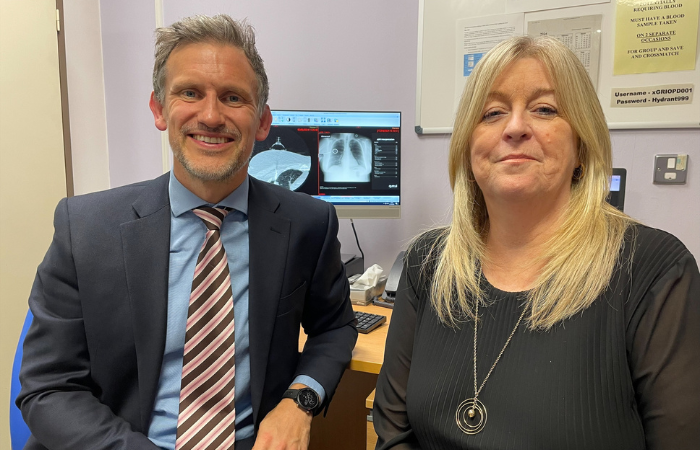Patient hails ‘incredible’ use of AI to speed up detection of lung cancer
Published: 7 November 2024
A woman whose lung cancer was detected with the help of Artificial Intelligence as part of our RADICAL study has praised the “incredible” speed of her diagnosis and treatment.
A woman whose lung cancer was detected with the help of Artificial Intelligence as part of our RADICAL study has praised the “incredible” speed of her diagnosis and treatment. The study, which is taking place across NHS Greater Glasgow and Clyde, is being delivered by the Digital Health Validation Lab alongside West of Scotland Innovation Hub.
Diane McCallum, 60, was referred for a chest X-ray at New Stobhill Hospital by her GP in May this year after she had been struggling with a long-term, persistent cough. Her X-ray image was analysed by Qure.ai's AI software, qXR, which flagged up an abnormality and placed it in a priority pile for examination by a radiologist.
Within hours, Diane had been contacted and referred for a CT scan which helped confirm her diagnosis of early-stage lung cancer, and treatment was arranged by NHS Greater Glasgow and Clyde Respiratory Consultant Dr John MacLay. She was operated on using robotic keyhole surgery at the Golden Jubilee Hospital to remove the upper lobe of her right lung.
The mum-of-three, who has one young grandchild, is now in the process of having four rounds of preventive chemotherapy at the Beatson West of Scotland Cancer Centre to reduce the chance of any cancer returning. In total, her diagnosis and delivery of treatment took around seven weeks, with AI being used to “fast track” her X-ray image for the attention of clinicians rather than it being sifted through along with hundreds of “normal” images.
Taking place across NHS Greater Glasgow and Clyde, our RADICAL study integrates Qure.ai’s qXR solution into real-world clinical workflow. The solution automatically segregates ‘normal’ chest X-rays and flags abnormalities such as masses or lung nodules, enabling the prioritisation of patient case reporting for clinicians - speeding up the start of a patient’s care journey from weeks to days.
Diane said: “When I went for my X-ray in May I remember seeing a poster in the hospital explaining the trial using AI and even at that point I was really impressed. I had my X-ray at about 3.30pm, and by 9.15am the following day I’d had a phone call to say something had been found and that I was being referred for CT imaging. After that, everything moved so quickly and my Consultant Dr MacLay said the cancer was quite early and localised, and he told me they were going to throw everything at it.
“I then had the operation to remove my right upper lobe using robotic keyhole surgery, which was also very impressive and meant my recovery was good. Everything about it was incredible, but the best thing for me was that X-ray. It just meant everything from that point was dealt with so quickly. It made such a difference for it all to happen within weeks rather than months and meant the cancer wasn’t able to spread. My outcome is undoubtedly better than if it has been left there to get worse.
“Having the AI enhancement at the beginning of the process is life saving really. Who knows how it might have turned out without this AI.”
Professor David Lowe, Professor of Health Innovation at the University of Glasgow and Emergency Medicine Consultant at NHS Greater Glasgow and Clyde, said: “Worldwide healthcare systems have a significant challenge in the detection of lung cancer. At present, 40-50% of patients present with advanced or stage 4 cancer, leading to poorer outcomes.
“If we can spot cancer earlier, by speeding up the time and accuracy of the 100,000 chest X-rays performed each year at NHSGGC, we can improve time to further imaging, and subsequent treatment. Qure’s chest X-ray AI, which is being evaluated as part of the RADICAL study across NHSGGC, will help orchestrate benefits for the whole patient care pathway.”
First published: 7 November 2024


